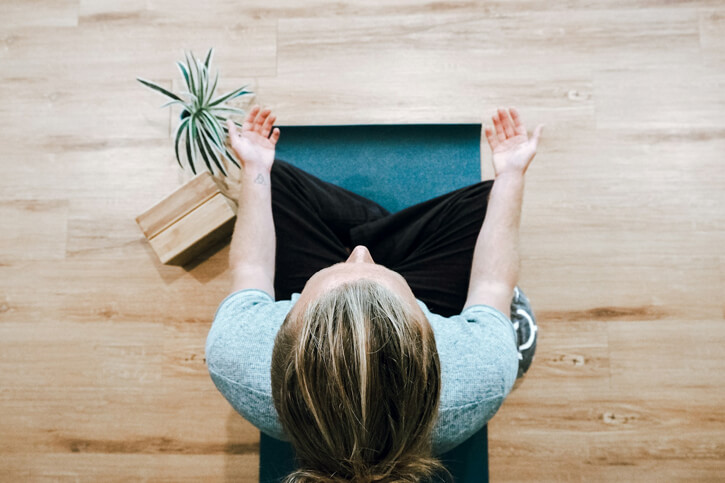Meditation and mindfulness are now seemingly ubiquitous aspects of Western culture, around which a substantive industry has grown, estimated to be generating well over $1 billion in revenue. Meditation has at various times been proposed as the solution, if not one of them, for most of what ails our increasingly emotionally challenged society. Whether it is in the context of formal therapy, corporate environments, or schools, it is seen as a valuable and effective intervention. One that can help all of us deal with everything from the stresses of daily life through to clinical problems such as anxiety and depression.
There is certainly evidence that mindfulness-based techniques can have a valuable role in helping manage challenging problems of mental ill-health. For example, a formal psychotherapeutic application of mindfulness known as Mindfulness-based Cognitive Therapy (MBCT) has been shown to reduce the likelihood that patients with depression will experience a relapse of their condition, and it is something I have recommended on many occasions patients I have been treating.
Is there a downside of the ubiquity of mindfulness, has the pendulum swung too far?
The widespread commercialization of mindfulness itself has been the subject of criticism, that “everyone is peddling mindfulness… so many cashing in on the meditation craze”. On a more theoretical or political level, that an emphasis on mindfulness is part of an increasingly pervasive shift of responsibility from the community to the personal: that we should be less interested in advocating for social change – to improve things for ourselves and those around us – and instead accept responsibility for changing our inner state, how we process and deal with the problems of daily life.
However, there is another far less recognized and discussed problem with meditation and it’s more widespread application. That it might be doing harm to some people. The idea that meditation may have side effects or produce adverse outcomes, should perhaps not be all that surprising, if it can have the sorts of profound effects on the brain and mind that it is proposed to do. However, this is certainly not something which is part of widespread discourse. Or, perhaps most importantly, made known in its widespread promotion.
What is the nature of these problems?
There are a considerable range of side effects reported in studies although it can be challenging to understand this data. First, it is important to distinguish them from some of the unpleasant experiences that can characterize meditation itself, including unpleasant emotions, thoughts, and physical sensations. Substantive and more persistent problems with mediation were brought to some prominence by research from Brown University which also noted that most previous clinical trials of meditation had failed to collect systematic data on adverse effects. This research identified multiple domains – cognitive, perceptual, affective, somatic, conative (changes in motivation), sense of self, and social – in which persistent adverse effects of meditation could occur. Side effects could be short term and mild but also much longer term and potentially more serious, including depression and suicidal ideation. They noted that adverse effects of meditation were more common in those engaged substantially in the practice, for example in long duration intensive retreats, but could also happen in individuals meditating in much more moderate ways.
This research drew attention to the area but was by no means unique. A recent review identified 61 studies reporting side effects of meditation, some quite profound, including hallucinations, depression and suicidal ideation. Although the review noted that the majority of reports were of problems resulting from in-person led meditation, they were also noted with increasingly commonly used meditation apps. The authors also made note of that these effects could occur in experienced meditators or those new to the process.
It is worth noting that there is controversy of what may be considered an adverse effect, even at the relative extremes. The boundaries between clinically defined psychosis – hallucinations or delusional thoughts – and the ‘non-ordinary states of consciousness (NSC)’ which may be seen as a common feature of some more intensive or prolonged forms of meditation, are not clear. However, the persistence of these experiences beyond when an individual is actually engaged in meditation can happen with potentially profound consequences.
There may also be inconsistency in how meditation related adverse experiences are managed that could contribute to longer term adverse outcomes. Clearly the proliferation of meditation teachers means that the support available to students of the practice will be highly variable and the response to emerging problems differ. How to judge the difference between the experience of discomfort, be it emotional, cognitive or physical, that ‘should’ be worked through as part of the practice of meditation itself, and the warning signs of something more problematic, which probably warrants cessation or reduction of meditation, is not at all clear. Exacerbating this issue is that there is no regulation of who may set themselves up as a ‘expert’ in this area, meaning that individuals with varying levels of training and experience are likely to be leading the experiences of the meditation naive.
There are some solutions at hand.
Cheetah House, a not for profit organization led by Willoughby Britton, an Associate Professor of Psychiatry and Human Behavior at Brown University Medical School, offers “First, Do No Harm”, a three-day training course providing meditation teachers an overview of meditation-related challenges, best practices for informed consent, screening and monitoring and trauma informed management strategies. However, until this form of education – and the implementation of its effects – becomes more widespread, it is a case of buyer, or meditator, beware.

Paul Fitzgerald, PhD, MBBS is Director of the School of Medicine and Psychology and a Professor of Psychiatry at the Australian National University in Canberra, Australia. He completed his Medical Degree at Monash University followed by a Masters of Psychological Medicine and professional training in Psychiatry leading to membership of the Royal Australian and New Zealand College of Psychiatrists. After a fellowship at the University of Toronto, he completed a research PhD in Psychiatry. Paul has conducted extensive research developing new treatments for depression and other conditions while continuing to practice as a psychiatrist and has established multiple clinical services in the provision of new treatment methods. He is the author of Curing Stubborn Depression: Emerging & Breakthrough Therapies for Treatment-Resistant Depression.





